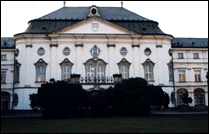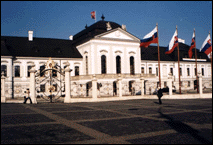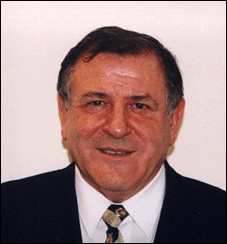 GOVERNANCE GOVERNANCE |

In November 1989 massive demonstrations were started by students in cities throughout Czechoslovakia, and were later joined by almost all citizens in the country. The named "Velvet Revolution" brought about the end of Communist rule. A non-Communist government took office, and the country's new leaders began the difficult process of transforming Czechoslovakia's political system, recreating a market economy, and reorienting foreign policy.The country's first multiparty elections were held in June 1990.
During the early 1990s, Czech and Slovak leaders within the government began to disagree on economic and political issues. Parliamentary elections held in June 1992 brought HZDS political party, led by Vladimir Meciar (link to Vladimir Meciar interview), to power in Slovakia, while a ODS political party, led by Vaclav Klaus, won control of the Czech Republic. Later that year, the leaders of the two republics decided to split the federation into two independent nations. A new constitution of Slovakia, adopted on September 1, 1992, went into effect with independence in January 1993. The constitution declared Slovakia to be a parliamentary democracy. The first parliamentary elections of independent Slovakia were held in 1994.
The Slovak Republic is a parliamentary democracy
with an autonomous legislature (parliament), executive
(president
and Cabinet)
and judicial branches (including a constitutional
court). The Constitution guarantees every citizen
the right to equality before the law irrespective
of gender, religion, race, national origin, social
status or political conviction. State bodies can
act only on the basis of the Constitution, within
its limits, and to the extent and in the manner
defined by law. International treaties on human
rights and other basic agreements that have been
ratified by the Slovak Republic, and promulgated
in a manner determined by law, take precedence over
the Slovak Republic's own laws, provided that they
secure greater constitutional rights and liberties.
 Executive Executive |
The executive power is distributed between President and Prime Minister (Head of the Cabinet). President is elected by the people for a five-year term and is responsible for naming the Prime Minister to head the Cabinet; the Prime Minister is typically the leader of the party with the majority of seats in National Parliament or the Head of a Coalition. Under the advice of the Prime Minister, the President also appoints a cabinet.

The role of the Prime Minister is embedded in the Constitution, Part Six, and Chapter Two. The authorities of the Prime Minister and Cabinet are much stronger than the authorities of President. The Government of the Slovak Republic is the supreme executive body. In the event that the National Council has passed a vote of suspicion or overruled a motion for a vote of confidence, the President shall dismiss the Cabinet.
Members of the Cabinet are individually accountable to the National Council of the Slovak Republic. The National Council of the Slovak Republic may also pass a vote of suspicion about an individual member of the Government; in such case the member shall be dismissed. In the event of the Prime Minister's resignation, the whole Cabinet shall resign.
The Prime Minister must sign all Cabinet's decrees. The Cabinet decides collectively on bills; regulations passed by the Government; its policy and implementation; principal measures to be taken to implement the economic and social programs of the Slovak Republic; proposals concerning the national budget and national revenue balance; international treaties entered into by the Slovak Republic; crucial issues in domestic and international affairs; the introduction of bills to the National Council of the Slovak Republic and initiation of public discussions on other major measures; motions for votes of confidence; granting pardon for administrative infringements; governmental appointments and dismissals as fixed by law, and other matters as may be defined by law.
The authority of President is much weaker than the authority of Prime Minister. Most of the powers are to represent the Slovak Republic, but he can also act absolutely independently, according to his own opinion. He is elected in popular elections for a term of five years. He has authorities in the area of diplomacy, he can discuss international treaties, he names the members of cabinet, is the head of the military power of the Slovak Republic. In special cases, he can dissolve the Cabinet. President has to sign all new acts - in case he does not sign an act proposal, the Parliament has to discuss it one more time.
 Legislation Legislation |
Slovakia has a single-chamber parliament called the Slovak National Council. The parliament's 150 members are elected to four-year terms by popular vote. All citizens over the age of 18 are eligible to vote in Slovakia; all citizens over the age of 21 are eligible to be elected to the Parliament.
 Judiciary Judiciary |
Slovakia has a Constitutional Court composed of ten judges. The President appoints these judges to seven-year terms, from a list of names proposed by the Parliament. The country's judicial system also includes the Supreme Court, regional courts, district courts, and a military court. Most judges for these courts are elected by parliament or appointed by the minister of justice.
 Local Government Local Government |
For administrative purposes, Slovakia is divided
into 8 regions and 79 districts. The regions are
directly subordinate to the federal government,
and regional officials are nominated by the federal
parliament. Administrative districts are directly
subordinate to the regions, and the people elect
their officials. |
In 2001, a public administration reform was adopted in Slovakia. However, due to misunderstandings and multifarious opinions among the government coalition politicians, only parts of the real reform proposal were adopted and the reform remains unfinished. Eight new higher territorial units (similar to the 8 regions) with regional parliaments were created. Although they act independently from the government, only a few authorities were shifted to these units from the government. Also, the district and regional government bodies were not weakened. The result of this reform was the creation of new bureaus with just a few significant changes.
The eight regions (kraje - singular kraj) are named after their main towns: Banskobystricky, Bratislavsky, Kosicky, Nitriansky, Presovsky, Trenciansky, Trnavsky, and Zilinsky.
 Membership in International Institutions Membership in International Institutions |
Slovakia is a member of the United Nations (UN), the Council of Europe (CE), Organization for Economic Cooperation and Development (OECD) and the Central European Initiative (CEI), a group promoting regional political and economic cooperation. In February 1994 the Slovak government signed the Partnership for Peace accord with Western nations, considered a precursor to joining the North Atlantic Treaty Organization (NATO). In October 1993 Slovakia became an associate member of the European Union (EU), and in 1995 the country applied for EU membership and formal negotiations were started in 1999. 2004 is set as the first possible date for Slovakia to join the EU.
 Political history of the independent Slovakia Political history of the independent Slovakia |

When talking about the political history of independent Slovakia, the period of 1994 to 1998 has to be mentioned. The Slovak Republic was led by Vladimir Meciar at the time.
Vladimir Meciar is probably the most controversial personality in Slovakia. Mr. Meciar was the Prime Minister of the Slovak cabinet for three times: from 27. 6. 1990 to 23. 4. 1991, from 24. 6. 1992 to 14. 3. 1994 and from 13. 12. 1994 to 29. 10. 1998. Together with Czech Prime Minister Vaclav Klaus, he is responsible for separating Czechoslovakia into two independent countries. He is one of the most charismatic politicians in the Central Europe.
Well-known in Slovak history is the parliamentary night of November 1994, when members of parliament were in non-stop discussions for 22 hours and 50 minutes. During this night, the coalition of political parties close to him took control over all-important positions in the parliament.
During his reign, many Slovak state-owned companies were sold for very small prices to people politically connected with his party - Movement for Democratic Slovakia.
When talking about the political history of independent Slovakia, the period of 1994 to 1998 has to be mentioned. The Slovak Republic was lead by Vladimir Meciar at the time.
Vladimir Meciar is probably the most controversial personality in Slovakia. Mr. Meciar was the Prime Minister of the Slovak cabinet for three times: from 27. 6. 1990 to 23. 4. 1991, from 24. 6. 1992 to 14. 3. 1994 and from 13. 12. 1994 to 29. 10. 1998. Together with Czech Prime Minister Vaclav Klaus, he is responsible for separating Czechoslovakia into two independent countries. He is one of the most charismatic politicians in the Central Europe.
Well-known in Slovak history is the parliamentary night of November 1994, when members of parliament were in non-stop discussions for 22 hours and 50 minutes. During this night, the coalition of political parties close to him took control over all-important positions in the parliament.
During his reign, many Slovak state-owned companies were sold for very small prices to people politically connected with his party - Movement for Democratic Slovakia.
Under Meciar's rule [1992-1994 and 1994-1998], Slovakia was invited neither to join NATO nor to start EU accession talks due to what the West called "shortcomings in the country's democracy".
NATO and EU entry chances for Slovakia opened only after 1998, when Meciar's government was ousted in the general election by the joint opposition and replaced by the pro-European cabinet of Mikulas Dzurinda.
"We, the Slovak nation, Mindful of the political and cultural heritage of our forebears, and of the centuries of experience from the struggle for national existence and our own statehood, in the sense of the spiritual heritage of Cyril and Methodius and the historical legacy of the Great Moravian Empire, proceeding from the natural right of nations to self-determination, together with members of national minorities and ethnic groups living on the territory of the Slovak Republic, in the interest of lasting peaceful co-operation with other democratic states, seeking the application of the democratic form of government and the guarantees of a free life and the development of spiritual culture and economic prosperity, that is, we, citizens of the Slovak Republic, adopt through our representatives the following Constitution:..."
URL LINK: Full text of the Constitution of the Slovak Republic |

